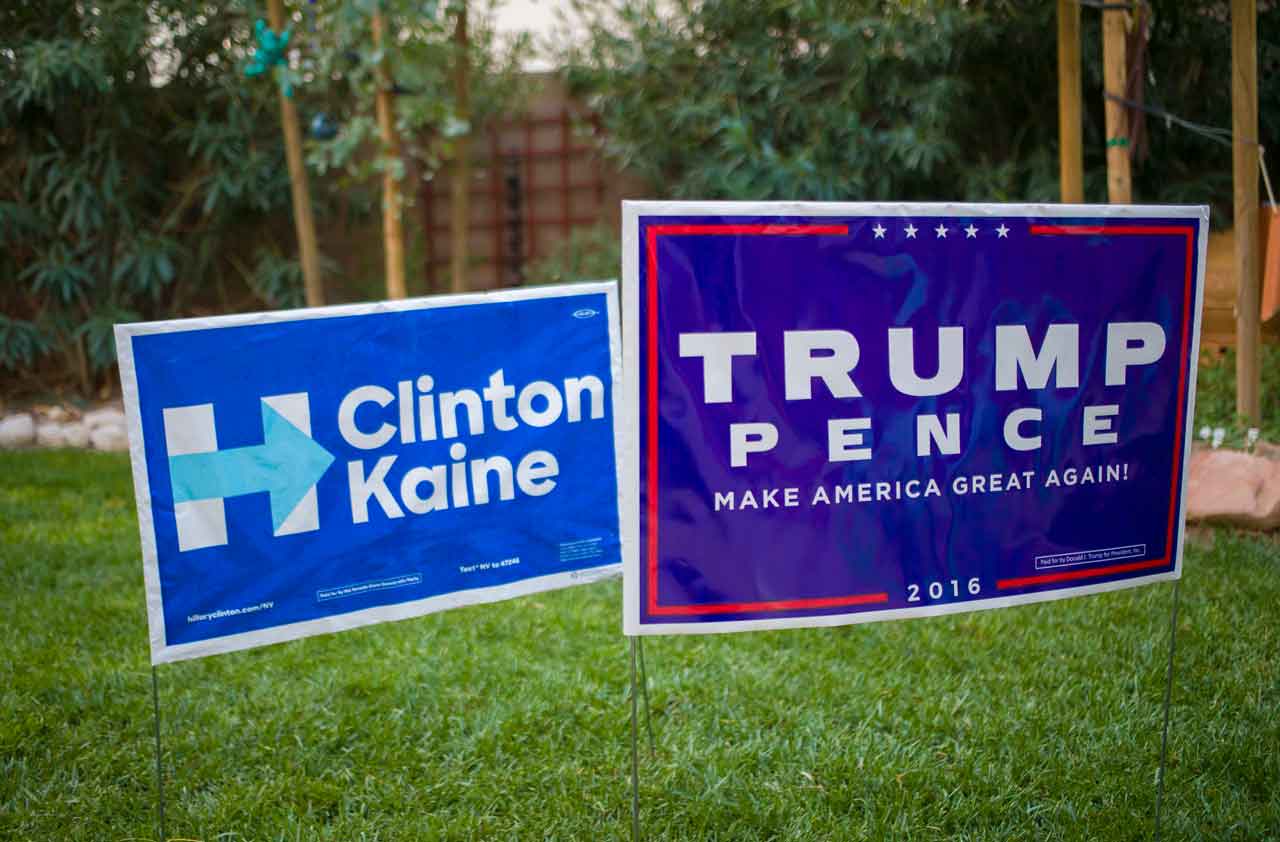What Investors Should Learn from the Presidential Election
How markets reacted to Donald Trump’s presidential win proves that you should focus on investing for the long haul.


Profit and prosper with the best of Kiplinger's advice on investing, taxes, retirement, personal finance and much more. Delivered daily. Enter your email in the box and click Sign Me Up.
You are now subscribed
Your newsletter sign-up was successful
Want to add more newsletters?

Delivered daily
Kiplinger Today
Profit and prosper with the best of Kiplinger's advice on investing, taxes, retirement, personal finance and much more delivered daily. Smart money moves start here.

Sent five days a week
Kiplinger A Step Ahead
Get practical help to make better financial decisions in your everyday life, from spending to savings on top deals.

Delivered daily
Kiplinger Closing Bell
Get today's biggest financial and investing headlines delivered to your inbox every day the U.S. stock market is open.

Sent twice a week
Kiplinger Adviser Intel
Financial pros across the country share best practices and fresh tactics to preserve and grow your wealth.

Delivered weekly
Kiplinger Tax Tips
Trim your federal and state tax bills with practical tax-planning and tax-cutting strategies.

Sent twice a week
Kiplinger Retirement Tips
Your twice-a-week guide to planning and enjoying a financially secure and richly rewarding retirement

Sent bimonthly.
Kiplinger Adviser Angle
Insights for advisers, wealth managers and other financial professionals.

Sent twice a week
Kiplinger Investing Weekly
Your twice-a-week roundup of promising stocks, funds, companies and industries you should consider, ones you should avoid, and why.

Sent weekly for six weeks
Kiplinger Invest for Retirement
Your step-by-step six-part series on how to invest for retirement, from devising a successful strategy to exactly which investments to choose.
The bumper stickers are still on cars, and campaign signs still decorate some of our neighbors’ yards, but it’s already clear that the 2016 presidential election will be discussed and studied for years to come. No matter how you feel about Donald Trump’s win over Hillary Clinton, investors can learn a great deal from the election, especially about how the markets reacted.
Simply put, the election is a great example of how emotions control the markets in the short term.
In the final days of the campaign, you could see the markets pricing in a Clinton presidency. The markets always like certainty and, whether you agree with Clinton’s policies or not, people know who she is and how she would govern. For the last quarter of a century, Clinton has been a familiar figure, and the markets reacted accordingly. The last two days before the election we saw growth in the markets as Clinton was expected to win.
From just $107.88 $24.99 for Kiplinger Personal Finance
Become a smarter, better informed investor. Subscribe from just $107.88 $24.99, plus get up to 4 Special Issues

Sign up for Kiplinger’s Free Newsletters
Profit and prosper with the best of expert advice on investing, taxes, retirement, personal finance and more - straight to your e-mail.
Profit and prosper with the best of expert advice - straight to your e-mail.
As results came in on Election Day, you could see the markets react to the increasing possibility of a Trump presidency. After-hours trading started to drop. As it became more evident that Donald Trump was going to win, futures started taking a nose dive. When Trump was announced as the winner and he spoke, the markets started to rebound. The next day, once Wall Street had processed the results and the pundits began to dig into Trump’s actual policies and proposals, the markets garnered some momentum, finishing the day up around 250 points.
The election serves as a classic example of how emotions — euphoria, fear, greed — have the tendency to drive short-term markets. That’s when investors should be careful, as we can trip up over own biases and emotions. We should think about riding out that emotional volatility, which is increasingly hard to do in this age of social media and instant communications. With so many stories out there that can impact our investment strategies, we have to do our diligence on authors and their articles. We have to vet the information we come across and the biases it might contain.
All of us have to remember that investing is usually a long-term proposition and fundamentals will eventually take over. That’s one of the reasons having an experienced, knowledgeable adviser can help. Of course, investors need to trust the advisers they work with to build a proper allocation or offer recommendations. Just like filtering out news stories, investors need to do their research when it comes to advisers and money managers.
When looking for an adviser, investors should consider finding an adviser that can review how volatility can impact their retirement and put together a plan considering asset allocation based on their needs and their situation. The best financial plans are typically built for the long haul. Sure, there might be short-term volatility, but the shrewdest investors known to turn off the noise and keep focused on their long-term plans.
Investing can involve riding an emotional roller coaster. It comes with the territory. But a good adviser can help make sure investors are strapped in tightly with a secure seat belt and a strong harness over their shoulders. Over the long term, with the right adviser and plan in place, investors will be able to survive the ups and downs of the market and emerge stronger than when they started in the markets.
Markets will always cycle, of course, but, in the long haul, investors will typically be fine if they remain aware that fundamentals drive the market – even as we all experience emotional highs and lows with each election and news cycle.
Curt D. Knotick is a financial adviser and chief executive officer at Accurate Solutions Group, LLC, based out of Butler, Pa. He has more than 26 years’ experience in the financial industry. ).
Investment Advisory Services offered through Global Financial Private Capital, an SEC Registered Investment Adviser. ).
Kevin Derby contributed to this article. ).
Profit and prosper with the best of Kiplinger's advice on investing, taxes, retirement, personal finance and much more. Delivered daily. Enter your email in the box and click Sign Me Up.

Curt D. Knotick is a financial adviser, insurance professional and managing partner at Accurate Solutions Group. He hosts the radio program "Your Retirement Blueprint" with Curt Knotick.
-
 How to Turn Your 401(k) Into A Real Estate Empire
How to Turn Your 401(k) Into A Real Estate EmpireTapping your 401(k) to purchase investment properties is risky, but it could deliver valuable rental income in your golden years.
-
 My First $1 Million: Retired Nuclear Plant Supervisor, 68
My First $1 Million: Retired Nuclear Plant Supervisor, 68Ever wonder how someone who's made a million dollars or more did it? Kiplinger's My First $1 Million series uncovers the answers.
-
 How to Position Investments to Minimize Taxes for Your Heirs
How to Position Investments to Minimize Taxes for Your HeirsTo minimize your heirs' tax burden, focus on aligning your investment account types and assets with your estate plan, and pay attention to the impact of RMDs.
-
 Don't Bury Your Kids in Taxes: How to Position Your Investments to Help Create More Wealth for Them
Don't Bury Your Kids in Taxes: How to Position Your Investments to Help Create More Wealth for ThemTo minimize your heirs' tax burden, focus on aligning your investment account types and assets with your estate plan, and pay attention to the impact of RMDs.
-
 Are You 'Too Old' to Benefit From an Annuity?
Are You 'Too Old' to Benefit From an Annuity?Probably not, even if you're in your 70s or 80s, but it depends on your circumstances and the kind of annuity you're considering.
-
 In Your 50s and Seeing Retirement in the Distance? What You Do Now Can Make a Significant Impact
In Your 50s and Seeing Retirement in the Distance? What You Do Now Can Make a Significant ImpactThis is the perfect time to assess whether your retirement planning is on track and determine what steps you need to take if it's not.
-
 Your Retirement Isn't Set in Stone, But It Can Be a Work of Art
Your Retirement Isn't Set in Stone, But It Can Be a Work of ArtSetting and forgetting your retirement plan will make it hard to cope with life's challenges. Instead, consider redrawing and refining your plan as you go.
-
 The Bear Market Protocol: 3 Strategies to Consider in a Down Market
The Bear Market Protocol: 3 Strategies to Consider in a Down MarketThe Bear Market Protocol: 3 Strategies for a Down Market From buying the dip to strategic Roth conversions, there are several ways to use a bear market to your advantage — once you get over the fear factor.
-
 For the 2% Club, the Guardrails Approach and the 4% Rule Do Not Work: Here's What Works Instead
For the 2% Club, the Guardrails Approach and the 4% Rule Do Not Work: Here's What Works InsteadFor retirees with a pension, traditional withdrawal rules could be too restrictive. You need a tailored income plan that is much more flexible and realistic.
-
 Retiring Next Year? Now Is the Time to Start Designing What Your Retirement Will Look Like
Retiring Next Year? Now Is the Time to Start Designing What Your Retirement Will Look LikeThis is when you should be shifting your focus from growing your portfolio to designing an income and tax strategy that aligns your resources with your purpose.
-
 I'm a Financial Planner: This Layered Approach for Your Retirement Money Can Help Lower Your Stress
I'm a Financial Planner: This Layered Approach for Your Retirement Money Can Help Lower Your StressTo be confident about retirement, consider building a safety net by dividing assets into distinct layers and establishing a regular review process. Here's how.